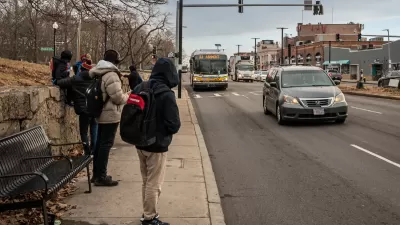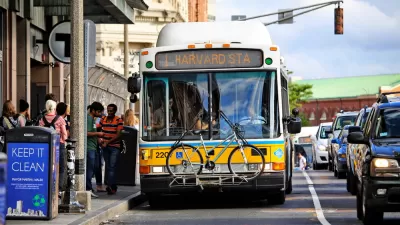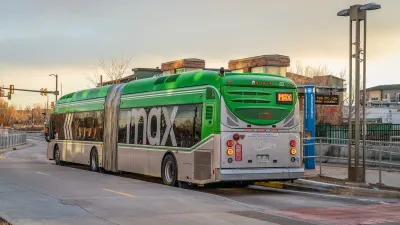Gold Standard is the term used by the Institute for Transportation & Development Policy to define world-class BRT service. A recently released ITDP study, underwritten by the Barr Foundation, argues for more Gold Standard service.
"The report argues that the city should be pushing for the 'gold standard' of bus rapid transit," writes Nicole Dungca of The Boston Globe. "A group of mass transit specialists and community activists convened by the [Boston-based] Barr Foundation, "want that to be a reality for Greater Boston."
The Silver Line operates on an exclusive lane for part of its route, but more is needed to attain Gold Standard status. [More on that line's shortcomings below.] "The elements of bus rapid transit also include allowing buses to have shorter waiting times at intersections to cut commute times, and elevated platforms so riders can board quickly."
The system is prominent in dozens of cities, such as Cleveland, Los Angeles, Mexico City, and Rio de Janeiro, according to the report. Nearly 100 corridors with bus rapid transit operate in 62 cities worldwide.
However, no U.S. BRT system "has been certified by experts as the 'gold standard,'" writes Dungca. "That distinction has gone to only a few cities, such as Belo Horizonte, Brazil, and Lima, Peru.
Cost effective transit investment
“For a number of high-demand corridors, BRT could provide fast, comfortable, reliable service at lower cost than alternatives,” the report said. “Investment in BRT elsewhere in the United States has shown that on average, BRT can be seven times more affordable than light rail, per mile.”
Background - from report's executive summary [PDF]:
To better understand whether and where BRT could work in the region, the Barr Foundation convened the Greater Boston BRT Study Group [in 2013]. Made up of diverse stakeholders and transit experts from across the city, the BRT Study Group partnered with the Institute for Transportation & Development Policy (ITDP), an internationally respected organization, to investigate the possibilities for implementing BRT throughout the metropolitan area.
According to the ITDP blog, they "analyze(d) a number of potential corridors in which BRT could reduce congestion on the T, serve underserved communities or groups, provide more direct connections between neighborhoods, and serve planned future development."
About the existing Silver Line service:
From Wikipedia: "Speed and schedule performance have disappointed some transit advocates and the Silver Line routes fall far short of the minimum BRT Standard promulgated by the Institute for Transportation and Development Policy (ITDP). Some sections have an exclusive right-of-way, but other sections are bogged down by street running in congested mixed traffic."
Hat tip to American Association of State Highway and Transportation Officials' (AASHTO) "Daily Transportation Update", June 22.
FULL STORY: Area could benefit from more bus rapid transit, report says

Maui's Vacation Rental Debate Turns Ugly
Verbal attacks, misinformation campaigns and fistfights plague a high-stakes debate to convert thousands of vacation rentals into long-term housing.

Planetizen Federal Action Tracker
A weekly monitor of how Trump’s orders and actions are impacting planners and planning in America.

In Urban Planning, AI Prompting Could be the New Design Thinking
Creativity has long been key to great urban design. What if we see AI as our new creative partner?

King County Supportive Housing Program Offers Hope for Unhoused Residents
The county is taking a ‘Housing First’ approach that prioritizes getting people into housing, then offering wraparound supportive services.

Researchers Use AI to Get Clearer Picture of US Housing
Analysts are using artificial intelligence to supercharge their research by allowing them to comb through data faster. Though these AI tools can be error prone, they save time and housing researchers are optimistic about the future.

Making Shared Micromobility More Inclusive
Cities and shared mobility system operators can do more to include people with disabilities in planning and operations, per a new report.
Urban Design for Planners 1: Software Tools
This six-course series explores essential urban design concepts using open source software and equips planners with the tools they need to participate fully in the urban design process.
Planning for Universal Design
Learn the tools for implementing Universal Design in planning regulations.
planning NEXT
Appalachian Highlands Housing Partners
Mpact (founded as Rail~Volution)
City of Camden Redevelopment Agency
City of Astoria
City of Portland
City of Laramie





























